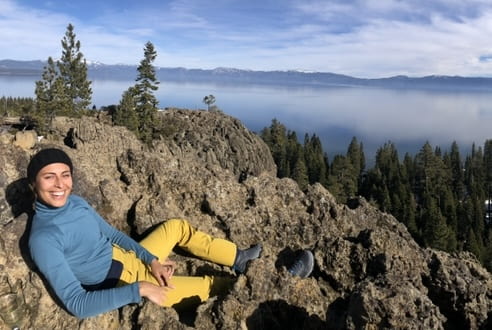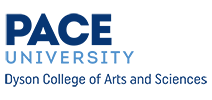Alumni Spotlight: An Interview with Sabrina Torres ’19

Sabrina Torres graduated from Pace University in 2019 with a BA in Environmental Studies. Below Sabrina reflects on her experience at Pace University and her personal journey in the environmental field.
What was your degree/major at Pace and why did you choose it?
At the time I was applying to undergraduate programs, my ultimate goal was to pursue Environmental Law. However, I began my Pace journey as a Psychology major. To my pleasant surprise, an elective option that stood out during my first semester was Social Responsibility and the World of Nature with Professor Lee Frankel-Goldwater. This course was a smörgåsbord approach towards understanding how the environment intersects with the social fabric of our lives. It was the first time in an educational setting for me that environmental concepts were introduced through a holistic-lens. On the very last day of the course, I physically ran to my counselor’s office and changed my major to Environmental Studies. Choosing this major was the pivotal moment in my academic career because I felt I could finally align my passion for restoring the environment with action gained from the knowledge and hands-on opportunities I now had access to.
What have your experiences with the Environmental Studies and Science department been like? Are there any specific faculty members you worked closely with?
I believe my class had about 10 environmental majors at the time. Because of this rather intimate size, I had the opportunity to work incredibly close with my peers and build meaningful relationships with my professors. It was normal to see the same students (now life-long friends) in multiple classes throughout the week. From what I recall, there were many group-style projects that consequently established a strong bond throughout the program where professors wouldn’t be surprised to regularly see us in groups outside of their offices either working on assignments or stopping by to say hello. The specific ENV faculty members I will always hold dear are Dr. Anne Toomey, Dr. Matt Aiello-Lammens, Dr. Michael Finewood, and Dr. Melanie Dupuis. Each of them offered a specific lens in this field that expanded my understanding of solving environmental issues with adaptive, socially-inclusive, systems-based thinking. Beyond the classroom setting, they were simply great people to get to know more personally and laugh with.
Can you tell us about the organization you’ll be working for and what you’ll be doing there?
Shortly after post-grad, still living in a virtual-pandemic reality, I obtained a job with Boulder County government for the position as their Sustainable Agriculture Community Outreach Planner. Boulder, Colorado is commonly known for their progressive stance on addressing environmental issues, so it’s no surprise to have found such a uniquely created position between their sustainability and planning departments that are working towards enhancing their local food systems and community involvement with farmers, ranchers, and constituents. My role focuses on encouraging more supportive Land Use policies for the agricultural community in Boulder County. Additionally, I build relationships with agricultural stewards and the greater community to explore possibilities for regenerative growth and adaptation in agriculture and inclusive sustainability planning in land management.
Can you tell us about the Master’s program you are pursuing? How has this degree pushed you further on your career path?
It was through my time as an Environmental Studies major at Pace where I learned that there are boundless career (and non-career) paths one can actively take to help protect the environment. From this insight, I decided, rather last second, to not pursue Environmental Law, and instead, continue my higher education through a Master’s Program in Sustainability Management at Columbia University.
I chose this Master’s program as a way to complement the foundation of my undergraduate degree with a practical curriculum in an emerging field. This degree pushed me in different ways. As a woman, especially as a woman of color in this field, it’s become apparent that scientific spaces, academic curriculum, and sustainability discussions are not regularly inclusive to populations that face the most harm from environmental degradation and social injustices. It’s through this underrepresentation in the sustainability field, that I’ve felt the call to action to ensure that I use my voice and access to resources to include the needs and solutions brought up by communities who are typically dismissed or forgotten at decision making tables.
The SUMA (Sustainability Management) Program at Columbia University prepared me with real life, hands-on experiences working on a wide-range of sustainability-focused consulting projects that have set me up with confidence in my career. I had plenty of opportunities to prepare equitable climate-resilient solutions towards natural resource management, environmental policy, supply chain operations, urban planning and design and much more.
It was towards the end of this program that I was re-immersed into the world of Sustainable Agriculture, a theme I dedicated myself to for my undergraduate senior thesis at Pace researching the Social-Ecological Resilience of Puerto Rico post Hurricane Maria in 2017.
What are your long-term career goals? What is it about the sustainable agriculture field that interests you?
My long-term career goals include continuing to pursue opportunities that motivate me to show up as my best every day. I look forward to contributing to the environmental field with both my academic and cultural knowledge as tools.
The sustainable agriculture field interests me because our well-being is interdependent with the health of our environment. For many reasons around the globe, this connection between humans and nature has been severed. I believe food (and laughter) are the most relatable concepts that bring people together and it’s my hope to reconnect people to the land and food that nourishes us as a way to heal and restore this timeless relationship with the Earth and with each other.
What is the most important thing you learned at Pace and can provide as advice to other students?
The most important thing I learned at Pace is that you are not meant to have all the answers – and no one expects you to. This lesson has been a gift in every step of my life since.
Recent Posts

Presenting at the Annual Society of Fellows Meeting
Congratulations to Environmental Science student Hannah Engelmeyer ’25 who won awards for their paper and their presentation at the Annual Meeting of the Society of Fellows!

COMMUNICATING SCIENCE
Environmental Science Professor Anne Toomey’s recently published book, Science with Impact: How to Engage People, Change Practice, and Influence Policy, gains media attention in WCAI.
